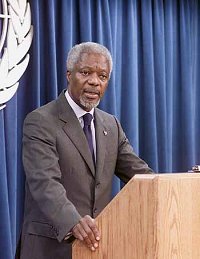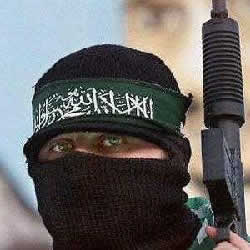 Iraq's national security adviser says he is shocked by UN head Kofi Annan's suggestion that the average Iraqi is worse off than under Saddam Hussein. Mouwaffaq al-Rubaie also accused the UN of shying away from its responsibility towards the Iraqi people.
Iraq's national security adviser says he is shocked by UN head Kofi Annan's suggestion that the average Iraqi is worse off than under Saddam Hussein. Mouwaffaq al-Rubaie also accused the UN of shying away from its responsibility towards the Iraqi people.The UN secretary general, who leaves office after 10 years on 31 December, told the BBC that the situation in Iraq was now "much worse" than a civil war. He also expressed his sadness at being unable to prevent the invasion in 2003.
Mr Annan told the BBC's Lyse Doucet that the current situation in Iraq was "extremely dangerous", and that he sympathised with the plight of ordinary Iraqis. "If I were an average Iraqi, obviously I would make the same comparison, that they had a dictator who was brutal but they had their streets, they could go out, their kids could go to school and come back home without a mother or father worrying: 'Am I going to see my child again?'
Of course, back then a man watching his daughter being married had to worry about whether Uday would show up at the reception.
"The society needs security and a secure environment for it to get on. Without security, not much can be done - not recovery or reconstruction."
Mr Rubaie rejected Mr Annan's comments, asking: "Doesn't Kofi Annan differentiate between the mass killing of Iraqis by the security and intelligence apparatus of Saddam Hussein and the present indiscriminate killings of civilians, Iraqi civilians, by the al-Qaeda terrorists in Iraq?"
He added: "I'm shocked and stunned by what Kofi Annan alluded to, that the condition was better under the dictatorship of Saddam Hussein."
Asked whether the situation in Iraq could now be classified as a civil war, Mr Annan pointed to the level of "killing and bitterness", and the way forces in Iraq were now ranged against each other. "A few years ago, when we had the strife in Lebanon and other places, we called that a civil war. This is much worse.
"We have a very worrisome situation in the broader Middle East," Mr Annan said, linking the ongoing conflicts in Iraq and Lebanon with the Israeli-Palestinian conflict and tensions over Iran.
He admitted that the failure to prevent the US-led invasion of Iraq in 2003 was a major blow to the UN, one from which the organisation was only beginning to recover. "It's healing but we are not there yet, it hasn't healed yet, and we feel the tension still in this organisation as a result of that."
Referring to the invasion, Mr Rubaie said: "The UN, I believe, shied away from the responsibilities towards the Iraqi people in 2003."

 Eight suicide bombers struck in quick succession Saturday in a wave of attacks that killed 55 people as Iraqi Shiites marched and lashed themselves with chains in ritual mourning of the 7th century death of a leader of their Muslim sect. Ninety-one people have been killed in violence in the past two days.
Eight suicide bombers struck in quick succession Saturday in a wave of attacks that killed 55 people as Iraqi Shiites marched and lashed themselves with chains in ritual mourning of the 7th century death of a leader of their Muslim sect. Ninety-one people have been killed in violence in the past two days. Candidates supported by Iraq's most senior Shiite Muslim cleric said Saturday they have no intention of setting up an Islamic state if they win this month's national election and instead will work to improve security, the economy and public services. National Security Adviser
Candidates supported by Iraq's most senior Shiite Muslim cleric said Saturday they have no intention of setting up an Islamic state if they win this month's national election and instead will work to improve security, the economy and public services. National Security Adviser